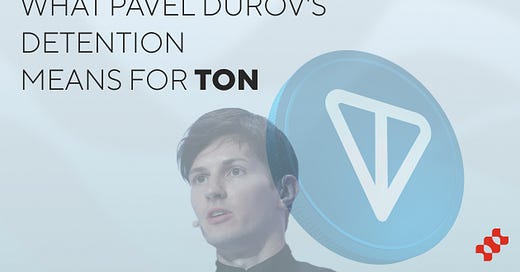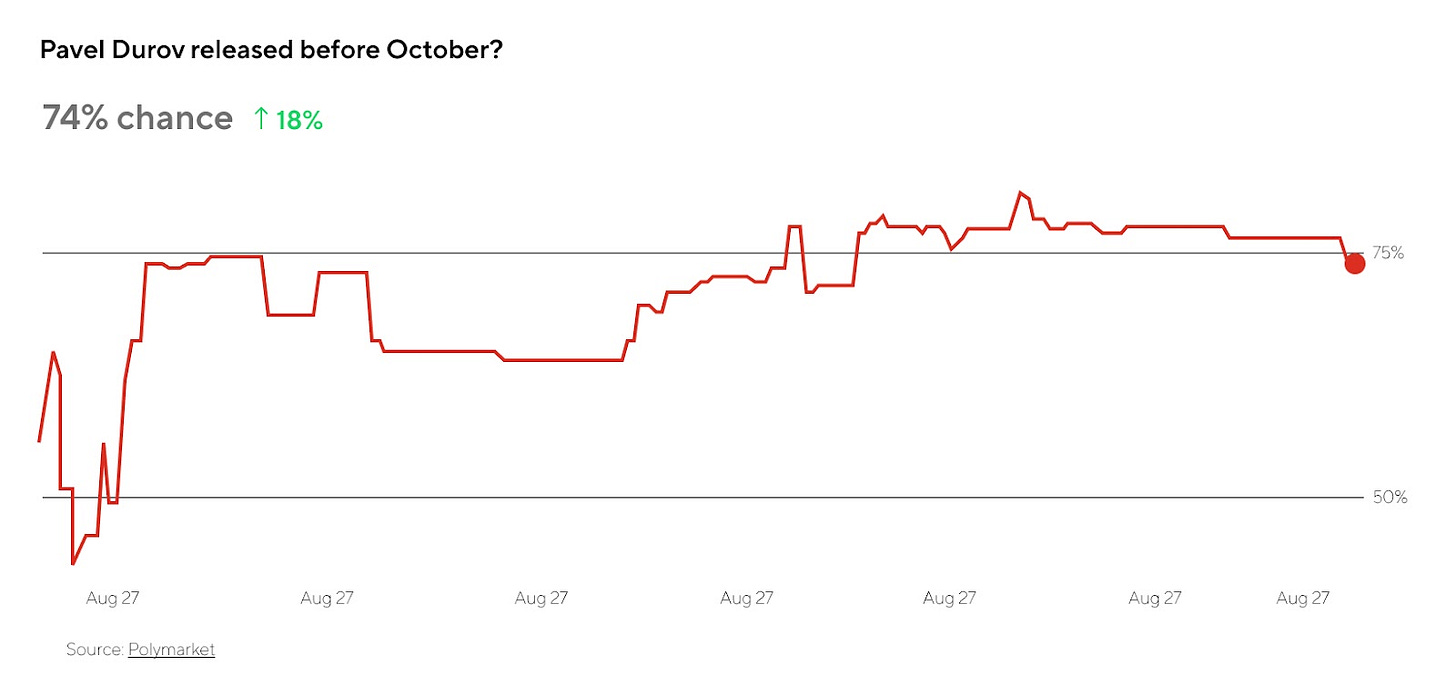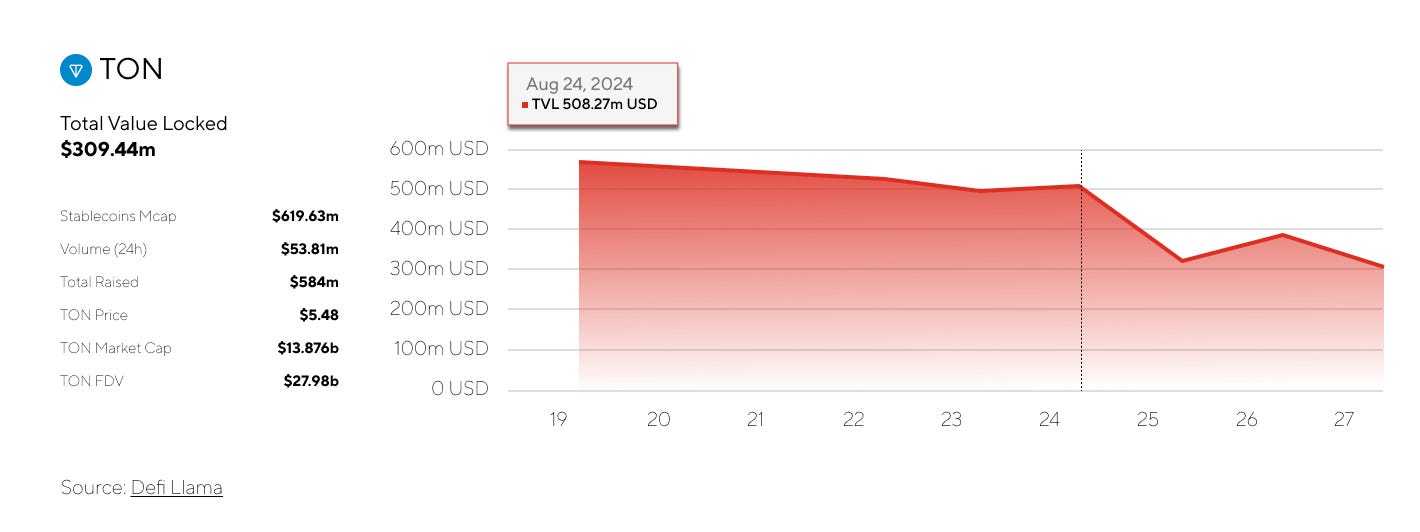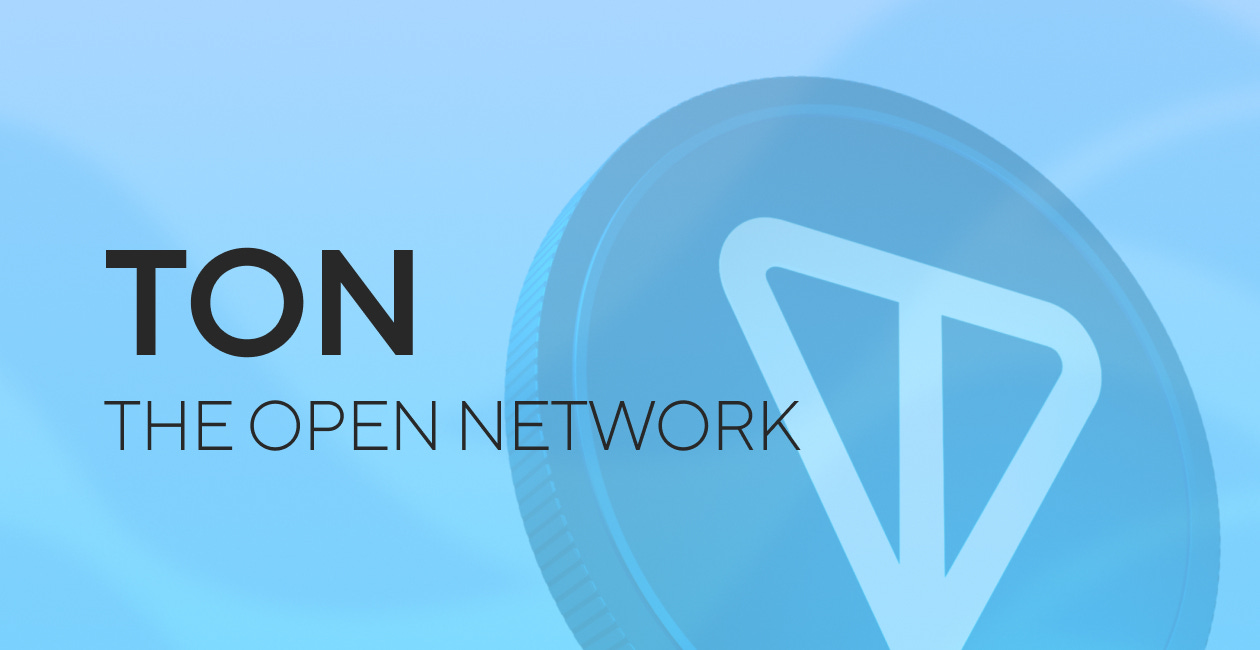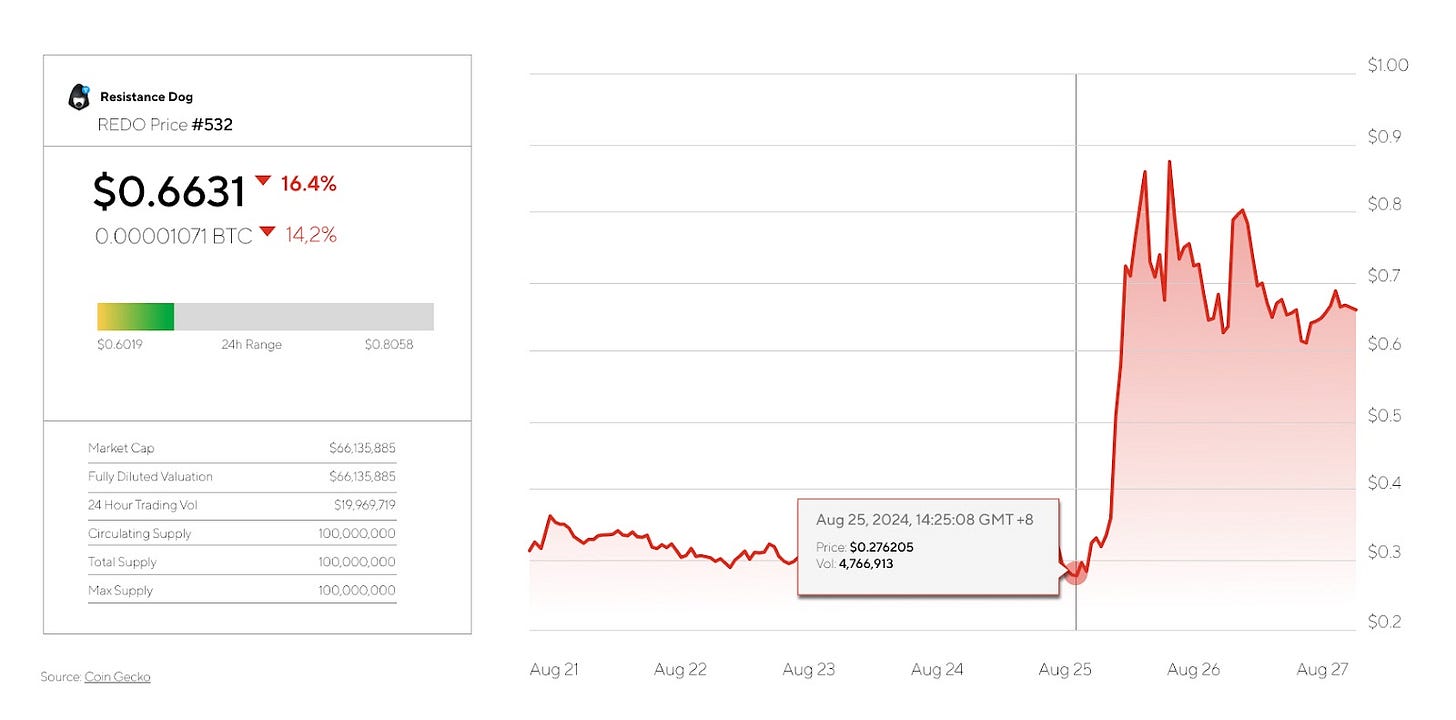What Pavel Durov's Detention Means for TON
Telegram's CEO was arrested. Still, our long-term outlook for TON remains optimistic.
by Joven Wu, Principal & Allen Chen, Research Analyst
What Happened?
Pavel Durov, the founder of Telegram, was arrested at Le Bourget Airport at 8 p.m. on Saturday, August 24. His detention has been extended until Wednesday, August 28.
The Paris Prosecutor's Office has outlined 12 potential charges against Durov, including:
Conspiracy to manage an online platform for organized illegal transactions
Refusal to provide legally required information or documents to authorized authorities for executing and using authorized interceptions
Conspiracy to possess images of minors related to child pornography
Conspiracy to disseminate, provide, or organize the provision of images involving child pornography
Conspiracy to acquire, transport, possess, provide, or transfer drugs
Conspiracy to provide, transfer, or organize the provision of equipment, tools, programs, or data for attacking and accessing automated data processing systems without a legitimate reason
Conspiracy to commit organized fraud
Criminal association for crimes punishable by at least five years of imprisonment,
Organized money laundering
Providing encryption technology intended to ensure confidentiality without legal declaration
Providing encryption means not specifically intended for identity verification or integrity control without legal declaration
Importing encryption means not specifically intended for identity verification or integrity control without legal declaration
The investigation into this case was initiated by the Cybercrime Unit of the Paris Prosecutor's Office, with further investigations carried out jointly by the Center for Combating Digital Crime (C3N) and the National Anti-Fraud Office (ONAF). French President Emmanuel Macron responded to the situation, clarifying that the arrest was not politically motivated. He stressed that in a rule-of-law country, freedoms on social networks and in real life are protected within a legal framework to uphold citizens' fundamental rights.
What we learned from other sources is that Telegram has implemented several measures to manage content and maintain transparency in its operations. The platform regularly reports on blocked accounts and bots related to terrorist content through a dedicated channel. Users can report problematic content directly within the app or via email. Since 2018, Telegram's privacy policy allows for the disclosure of user data to intelligence services in terrorism-related cases, provided there is a court order—though no such requests have been reported. A special bot tracks these requests for transparency. Telegram also addresses copyright violations in public channels, excluding personal and group chats. The app allows users to report various types of inappropriate content, including violence, pornography, and spam. However, details about Telegram's moderation team size and response times are not publicly available. These measures demonstrate Telegram's efforts to balance user privacy with content control and legal compliance.
For those interested, there is a prediction market on Polymarket regarding Pavel Durov's release, with the probability of his release before October currently at 74%.
What Impact Will This Have on TON?
Price and TVL
As of the time of writing, the price of the TON token has dropped to $5.50, representing a 23.6% decline from $6.80 at the time of the incident, according to Coingecko. DefiLlama data shows that the Total Value Locked (TVL) on The Open Network (TON) has fallen from $508 million on August 24 to $309 million, a significant decrease of 64.3%. However, when measured in TON terms, the decline is smaller but still substantial, at 40%.
Looking back, TON's journey has been filled with challenges from the very start:
In 2018, Telegram announced the launch of the TON blockchain project, aiming to create a new blockchain to support an in-app ecosystem. Through an Initial Coin Offering (ICO), Telegram raised $1.2 billion to fund the development of TON. However, the project encountered legal hurdles in 2019 when the U.S. Securities and Exchange Commission (SEC) ruled that the token sale involved unregulated securities, leading to the project's postponement.
In May 2020, Pavel Durov announced that Telegram would abandon the TON project, handing control over to the community. Telegram returned the $1.2 billion raised and paid an $18.5 million fine to the SEC. Despite these setbacks, the TON community continued the project, and "Toncoin" emerged as the spiritual successor to TON, eventually receiving Pavel Durov's endorsement in late 2021.
For more details, read:
Community Response
The TON community has responded to Pavel Durov's arrest with strong support and unity. Despite a significant decline in Toncoin's market price, the community quickly released a statement asserting that the project's core operations remain unaffected. They reaffirmed their commitment to the principles of free speech and decentralization, urging members to stay calm and continue building the ecosystem. This demonstrates their confidence in the community's ability to navigate the crisis.
The hashtag #FREEDUROV has gained significant traction on Twitter, with support from Elon Musk and several other crypto industry leaders. Some of these leaders have shown solidarity by making substantial token purchases. Richard Galvin, co-founder of the hedge fund DACM, which participated in TON's private round, commented in an interview with Bloomberg that it is "too early" to assess the long-term impact of Durov's detention on Telegram, though the market has already reflected this uncertainty over the weekend.
Jupiter co-founder Meow referred to the incident as "killing two birds with one stone," calling for the development of decentralized power structures to counter the control of centralized finance. Pantera Capital partner Franklin Bi expressed his support for Durov by simply posting the hashtag "#FreePavel."
Many TON ecosystem projects have changed their profile pictures to Resistance Dog in a show of support. Binance also changed TON’s logo to Resistance Dog on its platform. Additionally, TON's memecoin, $REDO, saw a gain of over 140% on Monday and was listed on three major centralized exchanges.
The TON Society launched the #DigitalResistance campaign, calling on community members to fight for freedom of speech and digital privacy by sharing the #FREEDUROV hashtag, adding the 🆓 emoji to their names, and changing their avatars or profile pictures to Resistance Dog.
Fragmented Perspectives and Potential Decoupling of Liberalism and Westernism
Within the crypto community, the sentiment surrounding TON remains largely positive. However, perceptions outside the crypto world might differ. Shaun Maguire noted in a tweet that some people initially held negative views of Pavel Durov, largely due to his Russian origins and the use of Telegram for illegal activities. The French government's charges against Durov, including complicity in possessing child pornography, have further contributed to these negative perceptions.
On the other hand, Durov is seen by many as a champion of free speech and privacy. For some, his arrest is viewed as part of a broader attack on liberal values in Western countries. This perspective is echoed in Vitalik Buterin's Warpost, where he observed a notable trend in reactions to Durov's arrest. In his social media feed, support for the arrest primarily came from Western sources, while non-Western voices largely remained silent. Although Vitalik acknowledges potential bias in his sample, he sees this pattern as significant. He interprets it as evidence of a growing divergence between liberalism and Western identity, a concept often discussed by Bruno Maçães. This observation suggests a shift in global perspectives on issues like free speech and privacy, with traditional Western liberal values potentially finding more support outside the West in certain instances.
On Tuesday, the UAE Ministry of Foreign Affairs released a statement that “The UAE is closely following the case of its citizen Pavel Durov,” emphasizing that the UAE has submitted a request to the Government of the French Republic to provide him with all the necessary consular services in an urgent manner. Pavel holds UAE citizenship and has lived in the UAE since 2017. The UAE has a strong interest in establishing itself as pro-innovation and actions from their government increase the perception that the UAE is a place for thought leadership with strong alignment with the entrepreneurial community.
Can TON Continue to Function as Usual?
The Open Network (TON) can and likely will continue to function as usual, despite recent events. Here's why:
1. Decentralized Structure
TON is designed as a decentralized network, meaning its operation doesn’t depend on any single individual or entity. This architecture ensures continuity even if key figures face personal challenges.
2. The TON Foundation
The TON Foundation is based in Zug, Switzerland, also known as "Crypto Valley," which provides a stable regulatory environment. The open-source codebase allows for global contributions, reducing reliance on any single developer or team. Additionally, Andrew Rogozov, a founding member, is capable of guiding the project in Pavel Durov's absence, ensuring leadership continuity.
3. Global Community Involvement
The TON Society data reveals a robust and diverse global community:
Total global community: 26,644 members
Strong presence in key regions:
CIS: 8,372 members
India: 6,214 members
Europe: 4,929 members
Hong Kong: 4,398 members
This widespread community involvement ensures ongoing development, support, and adoption of the TON ecosystem.
4. Regional Engagement
Active local communities in nine key regions organize conferences, forums, and events. This grassroots involvement maintains momentum and fosters innovation independently of any central authority.
5. Technical Resilience
The open-source nature of TON allows for continuous improvement and bug fixes from the global developer community, ensuring the network’s technical stability and evolution.
On Monday, TON recorded 932,000 active daily users, making it one of the most active days since its inception. This surge was largely driven by the DOGS airdrop, which distributed over $500 million in value to the community. The airdrop rewarded users based on their engagement with the DOGS Telegram mini-app, which awarded points for their usage of Telegram and TON.
However, due to the massive volume of transactions hitting the blockchain—setting a new transaction record on August 26—the TON blockchain temporarily stopped producing blocks for about six hours on the morning of August 28. A validator restart was initiated, and the blockchain resumed normal operations after the downtime. It is now functioning as expected.
Conclusion
The arrest of Pavel Durov has undoubtedly caused short-term turbulence within The Open Network (TON) ecosystem, as reflected by the significant drop in token price and Total Value Locked (TVL). However, this event has also sparked broader discussions about digital privacy, freedom of speech, and the evolving relationship between technology and governance.
In the short term, we can expect continued volatility and intense debate, particularly around digital rights and the balance between security and privacy. The global reaction to Durov's arrest, especially the contrast between Western and non-Western perspectives highlighted by Vitalik Buterin, suggests a potential shift in how liberal values are perceived and upheld across different regions. We are closely monitoring today's developments as Pavel's 96-hour detention period comes to an end, and the judge is set to decide on the next steps for the case
Despite these immediate challenges, we remain long-term bullish on TON for several reasons:
Attention Economy: The controversy has significantly raised TON's profile, potentially attracting more users and developers to the ecosystem.
Resilient Infrastructure: TON's decentralized structure and global community involvement ensure its ability to operate independently of any single individual or entity.
Community Solidarity: The strong and unified response from the TON community demonstrates resilience and commitment to the project's core values.
Technological Independence: As a blockchain project, TON's core operations are insulated from Telegram, reducing the impact of individual legal challenges.
Ongoing Development: The open-source nature of TON allows for continuous improvement and innovation, regardless of external events.
While the current situation has ignited important discussions about digital rights and governance, the actual impact on TON's technological development and long-term prospects appears limited. The project's decentralized nature, strong community, and technological resilience suggest that TON can weather this storm and potentially emerge stronger.
In conclusion, while short-term volatility is expected, the long-term outlook for TON remains positive. The current challenges may even reinforce the project's commitment to its core principles and attract greater attention from those who value digital privacy and decentralized systems. As the dust settles, we anticipate that the focus will return to TON's technological merits and its potential to reshape digital communication and transactions in a decentralized world.

